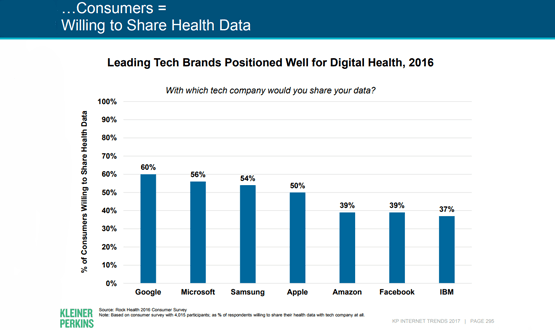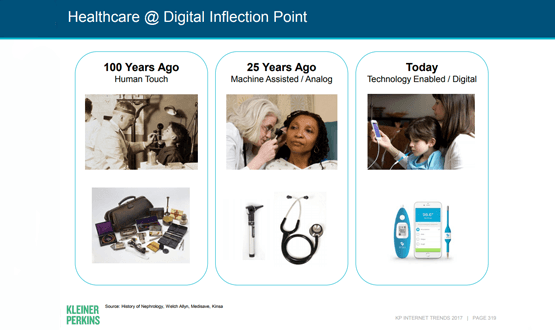People want to share their health data with Google, report reveals

The highly anticipated report, Internet Trends 2017, reveals that people are willing to share their health data with leading tech brands such as Google, proving their position in the digital health market.
The information is cited in investor and tech analyst Mary Meeker’s report, Internet Trends, which is highly regarded in the tech community for its insights into trends and predictions.
As part of the 31 May report, Meeker notes a survey stating that 60% (of US) consumers are willing to share their health data with tech giant Google in 2016, closely followed by Microsoft at 56%, Samsung, 54% and Apple at 50% – based on 4,015 respondents.
The other end of the graph showed consumers didn’t trust Amazon.com Inc. and IBM Corp. as much, with the companies only being trusted by 39% and 37% of people.
However, locally the statistics may come as a surprise considering the furore surrounding Google’s artificial intelligence branch DeepMind’s handling of patient data – together with Royal Free London NHS.
Despite the headlines, more trusts are signing up to work with the London based company, with Taunton and Somerset NHS Foundation Trust announcing its agreement in June.
Meeker, who is a former Wall Street securities analyst, devoted an entire section to healthcare, titled ‘Digital Inflection Point’ highlighting the importance of combining health and technology and its role in offering future solutions as the digital (health) age transforms – particularly in the UK.
The report pointed to the transformation of health through big data and cloud computing, reporting that healthcare data is growing at 48% (annually) worldwide.

Another big reveal was the shift in digital patient care; putting more patients at the centre of their own care. The report revealed consumers tech-hungry appetite for wearables – with the most popular in 2016 being accelerometers followed by heart rate monitors, gyroscopes and altimeters. This is based on analysis of 140 different wrist wearable devices.
When it comes to digital health adoption, 40% of 18-34 year olds own a wearable, followed by Gen X at 26% and Baby Boomers at 10%. However, when it comes to going online to find a physician Gen X is at 38%, right behind Millenials who top the chart at 48%. Overall, 88% of consumers are using one digital health tool.
The surge in wearables is equally matched by the rise in health-related apps, with downloads hitting more than 1.2 billion in 2016. Globally, the most downloaded health apps in 2015 were fitness-related at 36%, followed by disease and treatment and lifestyle and stress at 17%.
The electronic health record (EHR) and rise of centralised medical information are at the centre of this growing digital health trend with Meeker’s report showing that hospitals providing access to digital data is also on the rise—having increased sevenfold since 2013.
In just over 17 years, the healthcare industry has gone from x-ray machines to sphygmomanometers to ECGs – indicating the shift in digital capabilities.
Meeker’s overall presentation of health data suggests that data itself has the power to inform and educate medical and consumer communities and according to the lengthy report, medical research and knowledge is doubling every 3.5 years.





7 Comments
Very interesting report, technology is moving @ incredible speed and Google are one of those organisations that are keeping up with it. Google analytics is awesome as is the speed @ which they can process my data into useful information. Off on a journey to the vets, now where is my phone?
Looking at the source, I think answers were given in the context of wearable technology (sharing your fitness data) rather than sharing your more sensitive medical data and records. There’s a big difference in what DeepMind is doing compared with tracking your BMI, heart rate etc.
Not exactly sure of a UK or even European applicability of this study.
Cultural norms differ quite differently across the pond they might as well ask about chlorinated chicken, GM crops and Hormone Fed Beef, in that UK tolerance of these practices are much lower than their US counterparts.
The EU in particular has been less trustful of US digital giants with both the anti trust suits against Microsoft and Google being prime examples, I can’t see this being any different with health data.
.I’m not sure why this “report” – which appears to be entirely composed of a lengthy power-point presentation.
The reference on this slide states :-
Source Rock Health 2016 Consumer Survey of 4015 participants – and % of people *willing to share their data with tech company at all”!
I agree: *is* this a storey worth reporting – especially like this?
Consent is everything. To simply assume and hand over 1.6 million records over to google is not okay and is illegal. Keep doing this and we undermine trust and transparency which will have a detrimental impact on data sharing for the greater good in the future.
It really isn’t a big deal to ask for consent. The fact the NHS has yet to get its act together and makes an absolute hash of consent if it bothers at all is another matter.
Bit of a non-story surely? 60% of Americans would use Google with their health data… has a bearing on us in the UK how exactly?
The EU has one of best developed data protection legislation in the world and especially compared to the US. Data protection awareness is poor in the UK but probably a lot higher than in the US.
Sorry, I’m still not getting the point of this article (assuming it’s not sponsored)… Where did the DeepMind debacle take place? The UK. This survey is from which country, the US. …Please do the math because it’s sure as hell escaping me!..
Would not want, and 60% of a 4015 base study is hardly compelling. Of these 4015 How many are under treatment currently and how many have answere a rhetorical question? What was the question even asked?
Comments are closed.